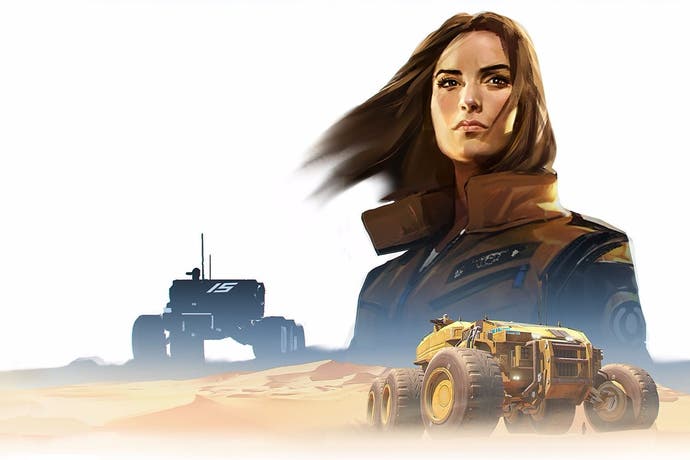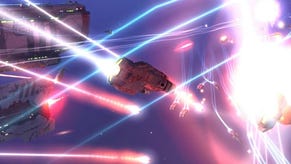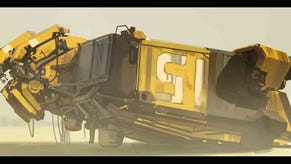Homeworld: Deserts of Kharak review
Kharaking good fun.
If Deserts of Kharak's development mutation was a difficult, complex or painful one, it certainly doesn't show. Originally known as Hardware: Shipbreakers, the game was transformed into a Homeworld prequel after Canadian developers Blackbird Interactive were handed the license by the mighty Gearbox (outbidding some prestigious peers to snatch it from the still warm grip of a bankrupt THQ). Hardware: Shipbreakers was always going to be at least a spiritual successor, but now it stands proud both as a bona fide prequel and a classy, capable RTS in its own right.
If, like so many, you're also curious whether a ground-based real-time strategy game does justice to its much lauded and still-revered ancestors, the answer to that is a reassuring "mostly." Don't be discouraged. Imagine that "mostly" delivered in warm and confident tones, with a bright smile. Deserts of Kharak will gift you gripes as uncomfortable and familiar as sand in your socks, but there are no scorpions waiting in your shoe here. Blackbird Interactive has made a good game.
Yet the more things have changed, the more they've stayed the same. Deserts of Kharak can present some truly classic RTS frustrations, including ropey pathfinding, particularly if units are trying to keep formation, and frequent total ambivalence to enemy fire. Then, moments later, it's all forgotten as the game woos you with an alternative tank upgrade, with shiny new cruise missiles or with the prospect of another messy skirmish for you to micromanage. It certainly has a few tricks. It also has style.
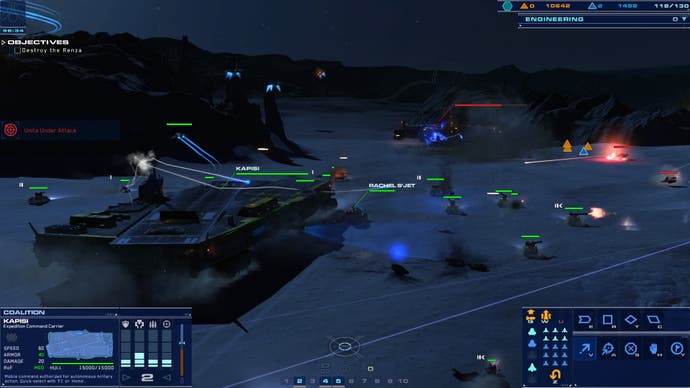
24 years on, gamers of a certain age are going to recall the dunes of Arrakis and the PC's profoundly influential Dune 2, with buggies once more trundling about the desert, docile worker units harvesting limited resources and ferocious tanks dominating the open ground. This time around, those buggies leap and bounce as they tear up the sand, those workers can be palmed off to support units (trusted with at least some measure of automation) and those tanks now come in many different flavours. Vive la evolution.
So much of the design just feels cool, from those bouncing buggies to the slowly crashing corpses of destroyed craft to the wings of strike fighters returning to the hangers of your carrier mothership after a sortie. Deserts of Kharak revels in its details, some as subtle as a grain, all of them coming together to make something that is almost sand-blasted smooth in how it looks and feels. Its UI is clear and simple, its shortcuts intuitive, its gradually growing roster of units well-balanced units and exciting to experiment with (though you already know those buggies are going to run rings around the artillery).
But rather than Dune 2, the classic RTS that Deserts of Kharak pays greatest tribute to is Ground Control, eschewing static bases, emphasising unit veterancy and demanding you make good use of terrain. The apparently featureless desert is soon revealed to be as good an arena as any to fight within, its rocks, mesas and dunes providing cover or vantage points. The best commanders control the dunes and ride high on the hilltops, funnelling their enemies toward them.
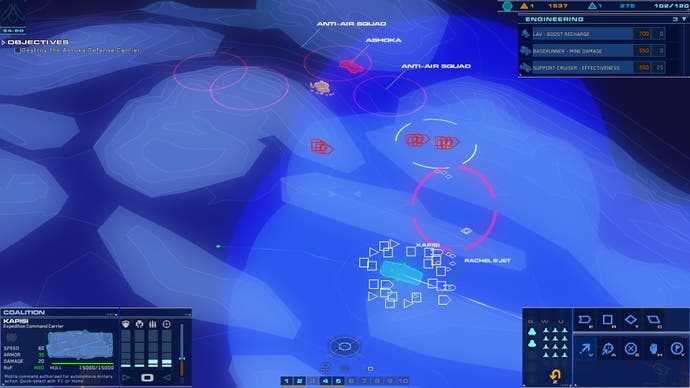
And then those commanders are brought back down to earth by some new, entirely unnecessary niggle. Bizarrely, while units sometimes block one another in narrow terrain, on other occasions they can drive through one another or outright merge together, causing you to wonder where key units may have gone. Checkpoints are frequently saved before cutscenes that can't be skipped. The camera doesn't zoom out nearly as far as it should and can get fiddly in a firefight.
Then it's all forgiven as you watch your surface fleet of vehicles carve their way through the desert, weapons blazing, units chatting away to each other and responding with dialogue that's so much more varied and natural than anything that any RTS game has ever dreamt of. From this moment on, let us rule that rote unit acknowledgements are a thing of the past. Deserts of Kharak's units respond with context-sensitive chatter, offhand comments or little insights into the work they're doing. It's another of those small details that helps paint a grander picture.
Deserts of Kharak isn't going to change the genre all that much, though. It's based upon solid and entertaining RTS mechanics, it has plenty of polish and it also still suffers from many of the genre's classic, classic bugs and flaws. Furthermore, it has two particularly serious shortcomings (though one may only be temporary) that weaken it when it's compared to its greatest rival, Starcraft 2.
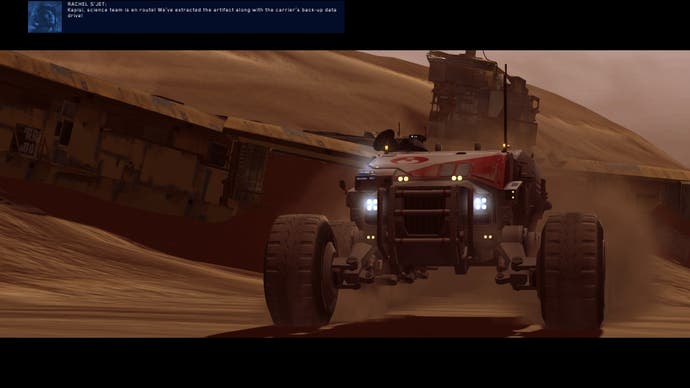
Firstly, it's suffering from a serious lack of online play. There are Deserts of Kharak players out there. There aren't many of them. Hopefully more will surface, because the game deserves a vibrant community, but that's something only time can tell us. Second, arriving after the considerable variety presented by Starcraft 2's closing single-player campaign in Legacy of the Void, Deserts of Kharak's own progression can feel pretty samey.
There's unit persistence between missions, which adds a particular sort of challenge (or outright handicap) to the start of each battle but, after not so long, the tasks tossed your way start to feel familiar. There's another enemy carrier to be cornered, or some special treasure to be hunted, or only so many variations of the task that is moving a carrier group from A to B to C. While it never gets boring, with all sorts of incidents and accidents along the way, it does become routine.
It's said that, if you journey through the desert for long enough, you can't help but walk in circles. Human beings are simply predisposed to do so. Deserts of Kharak represents no great strides for RTS games, offers no big ideas, nor presents any real surprises for the genre. Nevertheless, it still remains, by and large, a confident and capable game. You've been here before, these footsteps are familiar, but that's exactly why you'll feel comfortable treading them once more.
